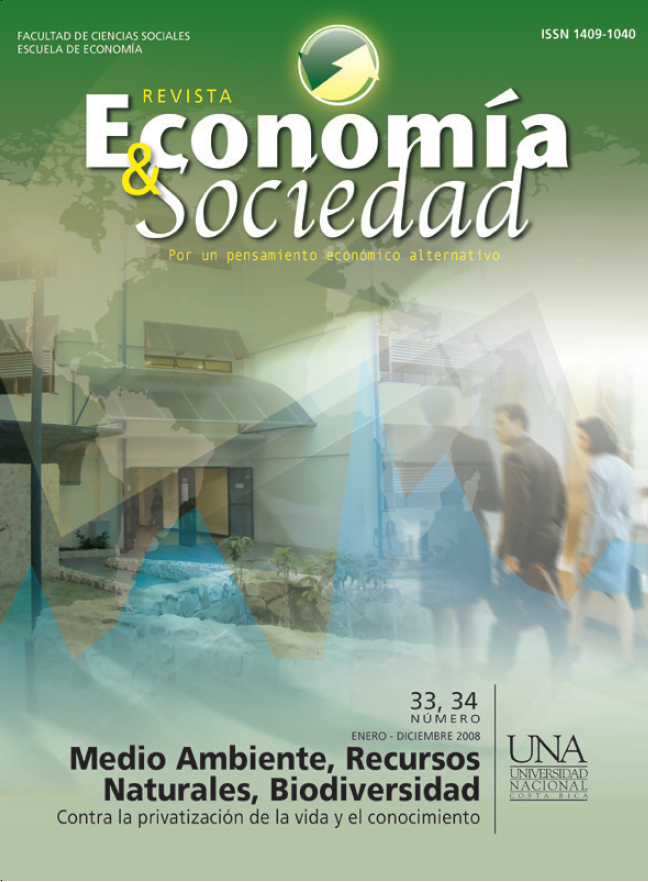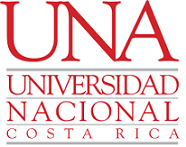LOS PELIGROS DEL DOBLE DISCURSO. DE LO INTERNACIONAL A LO LOCAL: El caso de la propuesta “Costa Rica Carbono Neutral - 2021”
Resumo
Resumen
Este trabajo analiza algunos aspectos de las negociaciones e iniciativas que intentan enfrentar el cambio climático a nivel internacional, poniendo énfasis en los mecanismos de compensación y la creación de los mercados de carbono, su significado en relación a la creación de “derechos de propiedad sobre la contaminación de la atmósfera” y en relación a la efectividad que estos esquemas tienen para enfrentar el Cambio Climático. Asimismo, se analiza su vinculación con la propuesta del actual gobierno de Costa Rica (Oscar Arias Sánchez, 2006-2010) denominada “Costa Rica, Carbono Neutral para el año 2021” y su pertinencia para enfrentar el Cambio Climático en nuestro país.
Abstract
This document analyzes some aspects of the international negotiations and initiatives that intent to face out Climate Change. It put emphasis on the offset mechanisms and carbon markets, their meaning in terms of the creation of “property” over the atmosphere contamination rights and in term of their efficiency to face the Climate Change. It also analyzes the relationship of these initiatives with the actual Costa Rican Government (Oscar Arias Sánchez, 2006-2010) proposal, named “Costa Rica, Carbon Neutral 2021” and its adequacy to confront Climate Change in the country.
Referências
Adam, D. 2006 “Can planting trees really give you a clear carbon conscience?,”
The Guardian, 7 October 2006. http://environment.guardian.co.uk/climat echange/story/0,,1889830,00.html
Alpizar, E. 2003. No pagar servicios ambientales a moncultivos forestales.
Ambientito # 123, Diciembre 2003. www.ambientico.una.ac.cr
Asamblea Legislativa, 2008. Proyecto Contrato de Préstamo Nº 7388 Costa Rica y sus anexos entre la República de Costa Rica y el Banco Internacional de Reconstrucción y Fomento (Banco Mundial) (denominado ecomercados II). San José: Asamblea Legislativa.
Baltodano J. 2007. Bosque, cobertura y recursos forestales. Ponencia. Capítulo4: Armonía con la Naturaleza. XIII Informe Estado de la Nación. 50pag www.estado nación.or.cr
Birdsey , 2004. Data Gaps for monitoring Forest Carbon in the US. An inventory perspective. Environmental Management,33 (supplement 1), pag1-8 .
Booth W, 1988. Johnny Appleseed and the Greenhouse: Replanting Forest of Mitigate Global Warming. Science 242,4875, Oct 1988: pag 28
Castro E., 2008, Cambio Climático, Conservación de Bosques y Derechos de Pueblos Indígenas. Darwin Australia: Reunión Internacional de Expertos sobre Pueblos Indígenas y Cambio Climático. Global Forest Coalición. www.globalforestcoalision.org
CMCC, 2005. Cuidar el Clima: Guía de la Convención Marco sobre el Cambio Climático y el Protocolo de Kyoto (edición revisada, 2005). Bonn, Alemania. Secretaría de la Convención Marco sobre el CambioClimático. 35pags
Coase R.H. 1988, The Firm, the Market and the Law. University of Chicago Press, 1988.
Contraloría, 2007 Memoria Anual. San José: Contraloría General de la República.
Chavez E., 2003. El PSA a plantaciones no beneficia al país. Ambientito # 123. Diciembre 2003. www.ambientico.una.ac.cr
ENCC 2007, Lineamientos para la elaboración de un Plan ante Cambio Climático. San José: MINAE, 19pags.
ENCC, 2008. Mercado de Carbono, un instrumento de mercado para la Cneutralidad de Costa Rica. San José: MINAE- pdf2 , 26 pags www.encc/publicaciones;
Falowski P et al, 2000. “The Global Carbon Cycle: A Test of our Knowledge of Earth as a System”. Science 290, 13 Oct. 2000 pag 5-25
Greenspan R. 2006, “Market Failure” Environmental Forum, March/April 2006, pag28-33
IPCC, 2007: Cambio climático 2007: Informe de síntesis. Contribución de los Grupos de trabajo I, II y III al Cuarto Informe de evaluación del Grupo Intergubernamental de Expertos sobre el Cambio Climático. IPCC, Ginebra, Suiza, 30 pags
Lohman L. , 2006. “Made in USA” a short story of carbon trading. In Carbon Tading: a critica conversation o climate change privatization and power. Lohman L. editor. Development Dialogue No 48: setember 2006. pag31-69. www. dehf.uu.se
Lohman L. 2006b. Lesson Unlearned In Carbon Trading: a critical conversation o climate change privatization and power. Lohman L. editor. Development Dialogue No 48: setember 2006. pag 71- 213 . www. dehf.uu.se
Monni S. 2004. Uncertainties in the Finnish Greenhouse Gas Emisión Iventory. Environmental Science and Policy 7, pag 87-98.
Movimiento Mundial por los Bosques, 2003. Las plantaciones de árboles no son bosques. Montevideo, Uruguay: WRM- material de campañas. www.wrm.org/publicaciones.
Movimiento Mundial por los bosques, 2008 Movimiento Mundial por los Bosques, 2008. Sinkwatch. www.wrm.org
Naciones Unidas, 1998, Protocolo de Kyoto de la convención marco de las NNUU sobre Cambio Climático. fccc/informal/83*ge.05-61702(s) 130605 130605.
Neeff, T; Eichler L.; Deecke I. ; Fehse J. 2007. Update on markets for forestry offsets. Turrialba, C.R : CATIE, 35 p. : il. – (Serie técnica. Manual técnico / CATIE ; no. 67)
Obersteiner M. et al. 2002 Quantifying a Fully Verifiable Kyoto. World Resource Review 14, 2002, p542.
SINAC, 2007. Estrategia para la sostenibilidad de la producción de bienes y servicios de bosques y plantaciones forestales en terrenos privados en Costa Rica 2007- 2010. San José: Gerencia Manejo de Recursos Naturales-SINAC
Smith K. 2008. The carbon neutral mith: offset indulgences for your climate sins. Amsterdam: Carbon Trade Watch. 80 pag. www.carbontradewatch.org.
UNEP, 2006. UNEP Launches Campaign to Plant a Billion Trees. UNEP- News Center-Press Releases. www.unep.org/billiontreecampaign
Van Hombergh, H. 2004. No Stone unturned; building blocks of environmental power vs. transnational industry forestry in Costa Rica. Latin American Research Series. Amsterdam: Dutch University Press. 312 pag. www.dup.nl
Vía Campesina, 2007. Documento de Fondo sobre Cambio Climático: los pequeños productores están enfriando el planeta. www.víacampesina.org
WRM, 2007. Nuestra Opinión. Boletín 125. www.wrm.org
Downloads
Publicado
Como Citar
Edição
Seção
Licença
This publication is subject to the Creative Commons License; therefore, its attributions and restrictions must be respected.
Authors publishing in this Journal accept the following conditions:
- Authors retain copyright ownership and give the Journal first publication right of the paper, which is registered with the Creative Commons Attribution-NonCommercial-ShareAlike 4.0 International License. This license allows third parties to use the published work provided it is sourced as firstly published in this Journal.
- Authors may enter into other independent and additional contractual agreements for the non-exclusive distribution of the article published in this Journal (e.g., to be included in an institutional repository or published in a book) provided it is clearly stated that the work was published in this Journal for the first time.
- Authors are allowed and recommended to publish their work on the Internet (for example, on institutional or personal pages) before and during the review and publication process, as it can lead to productive exchanges and a greater and faster dissemination of work published.

The Economía & Sociedad Journal, published by Universidad Nacional, is licensed under a Creative Commons Reconocimiento-NoComercial-CompartirIgual 4.0 Internacional License. Based on http://www.revistas.una.ac.cr/index.php/economia.








